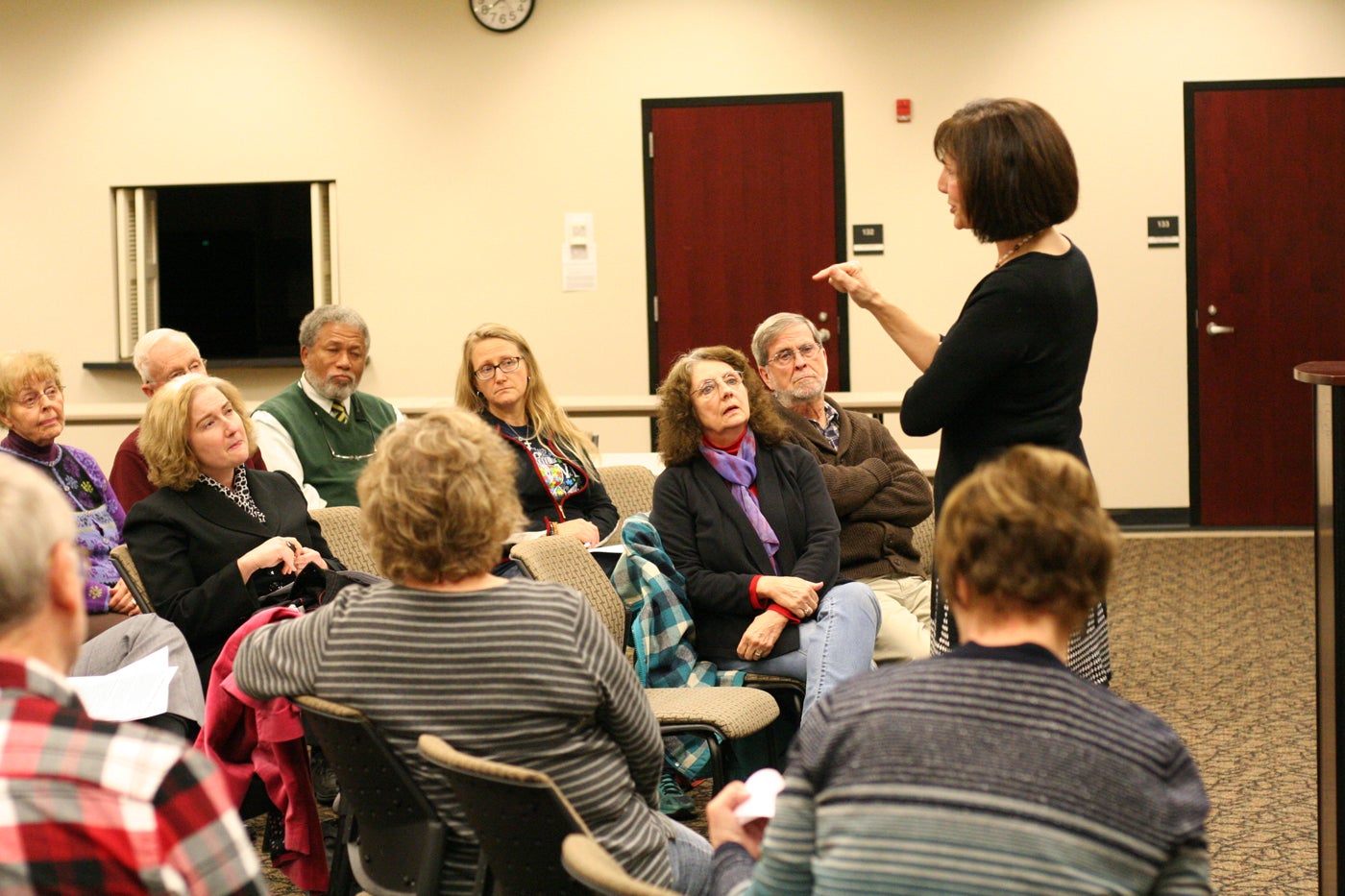A perfect storm — Reason for mass incarceration is combination of many issues, says EKU professor
Published 7:58 pm Thursday, March 15, 2018

- (Kendra Peek/kendra.peek@amnews.com) Carolyn Dupont and Boyle County Attorney Lynne Dean discuss criminal justice reform and House Bill 396 after Dupont's presentation at the Women's Network meeting Tuesday night.
Kentucky is “noteworthy” because of its high incarceration rates, according to speaker Carolyn Dupont, who spoke this week at a Women’s Network meeting in Danville.
The Women’s Network group offers community discussions about issues facing the nation, which are open to the public.
Dupont is an associate professor in the history department at Eastern Kentucky University, specializing in African-American studies. She is also running for a state senate seat.
“For the last 10 years, we have floated around in the top 15 (states for incarceration rates),” Dupont said. “A few years ago, we got as high as No. seven in the country and in the world. That is a really serious indictment against our state. We incarcerate at a higher rate than the Soviet Union, North Korea, China … We are currently ninth in the nation, ninth in the world, incarcerating our own people.”
But the problem, Dupont said, isn’t just a Kentucky one.
“America has a mass incarceration problem. We currently have 2.2 million people behind bars,” she said. “In addition to this 2.2 million people behind bars, we have 4.6 million people who are still under correctional control … Which means we have nearly 7 million people within our criminal justice system.”
Nationally, the rate has decreased, she said, while Kentucky’s rate continues to go up; and nine of the top 10 offenses for which people are incarcerated are low-level, non-violent offenses.
Dupont said she is looking at current incarceration within a broader historical context.
“I started hearing people say that criminal justice was the new Jim Crow in America. I was really very skeptical of that claim — how could it be? We’ve outlawed segregation in this country, we’ve outlawed a lot of the mechanisms for oppressing our black population … I thought that was a claim that was overreaching,” Dupont said. “As I began to study the issue, I’ve come to completely accept that that is true. This is really the new frontier for racial justice.
“If you care about racial justice, you need to care about mass incarceration. This phenomenon has (cost) people of color more than any other group.”
Dupont set the historical stage for those attending, explaining how the “Black Codes” were established after slavery was abolished.
“The states passed laws that were designed to trap people of color. It created a series of crimes and then entrapped black people in the criminal justice system. These were things such as vagrancy laws — you were a vagrant if you hadn’t signed a work contract by Jan. 30 that would obligate you to work for a certain plantation owner for an entire year. If you left that contract early, you were breaking the law and you could be arrested,” Dupont said. “There were a series of these laws, sometimes called ‘Black Codes.’”
She said a “convict lease system” would lease convicts out to private companies, which would house, feed, clothe and work the “leased” individuals.
“What this did was provide cheap labor for these companies and a whole lot of revenue for the state because these companies paid the state for these prisoners,” she said. “In 1898, Alabama got 73 percent of its revenue from leasing convicts to private companies. This is the way much of the south was rebuilt and industrialized.”
Eventually, she said, the system was outlawed, but it lasted until the 1920s in some parts of the country.
“It contributed to this perception of blacks as criminals … Since that time, the vast majority of people who have been incarcerated have been people of color,” Dupont said. “Take 1910, for example. We see that in 1910, 31 percent of incarcerated people were people of African descent, even though there were only about 11 percent in the U.S. population.”
In about 1970, Dupont said, the country began incarcerating people at a much higher rate.
“We had about 300,000 people behind bars. From 1970 to today, that number has gone from about 300,000 to about 2.2 million,” she said. “It’s not been increases in crime that have driven this.”
Dupont said a “perfect storm” of numerous factors led to skyrocketing incarceration. One component has been the “war on drugs.”
“It was pushed by a number of presidents who wanted to appear tough on crime, who wanted to appeal to the fears of whites, who were often stoked by the media, by images, race riots in some of our major cities,” she said. “We had this war on drugs, this crackdown, that was sold as something that would make us safer.”
In reality, she said, the policies created large racial disparities, pointing to the “war on gangs” as one example. The definition of the word “gang” has been used very loosely so that it can be used against minorities, she said.
“In certain cities — I believe it’s Denver — where 50 percent of the Latinos in Denver are identified as gang members,” she said. “Fifty-percent of Latinos in Denver are probably not members of gangs.”
Dupont also spoke about the differences between personal and systemic racism.
“I think it’s very important for us to distinguish between personal racism and systemic racism. Unfortunately, we live in a society where systemic racism is everywhere. And the problem with systemic racism is it’s very hard identify who’s responsible for that, but it shows up in policies that perpetuate racial disparities,” she said. “You can be completely non-racist in your heart and still work within a system that is deeply marred by institutional racism.”
She said it’s hard to figure out where the racism is coming from sometimes, because people don’t want to consider that they could be racist.

(Kendra Peek/kendra.peek@amnews.com)
Carolyn Dupont speaks at the Women’s Network meeting Tuesday evening regarding criminal justice reform.
“Racial discrimination does occur in some stages of our justice processing some of the time and in some places,” Dupont said. “Those small differences in treatment accumulate across the criminal justice system to result in very large racial disparities.”
It doesn’t end once a person is released, either.
Dupont said, “there is a whole network and web of disabilities that a person acquires once they are brought into the system.”
There are fees that a person cumulates through their sentence, perhaps through having to pay to wear an ankle monitor, or through having to pay for items they purchased while incarcerated, such as feminine products for women, she said. Those all add up, leaving some former inmates in debt when they are released.
Dupont said felonies make it difficult for a person to get a job; keep them from getting any kind of assistance from the federal government, unless that has been waived by the state; and lose their voting rights. There are four states, including Kentucky, where convicted felons don’t automatically regain voting rights.
Those four states — Florida, Kentucky, Virginia and Iowa — have processes for regaining those rights, but they can be costly and cumbersome, she said.
In Florida, Dupont said, there are 1.5 million felons who have served their time and do not have their voting rights restored.
“I don’t know about you, but I’m feeling that 1.5 million voters in Florida might make some differences in some elections, in a state that has historically been the focus of conflict and election difficulties,” she said.
Incarceration has a negative impact on children, Dupont said.
“In Kentucky, we have 33,000 children with at least one parent who is incarcerated,” she said. “In Kentucky, we have the most children, of any state, who have a parent who is incarcerated.”
When both parents are incarcerated, she said, that leaves grandparents or family members raising children that are not their own, or forces the kids into foster care. These children benefit from school services, such as the Family Resource and Youth Services Centers in the schools — which are facing budget cuts in Kentucky.
Dupont said, “both parties have been participants and are responsible.”
Dupont said incarceration is not the right answer when dealing with people with drug offenses.
“What we are doing is taking low-level offenders and turning them into real criminals,” she said. “We are taking low-level offenders and saddling them with felony convictions that dictate that they are certainly going back to prison.”
Dupont said it costs almost as much to send someone to jail for a year as it does to send a student through EKU for one year — about $22,000. That includes room, board, tuition and books, she said.
Dupont said she believes that money could be used to educate people, instead of housing them in prisons and jails.
Dupont also spoke about House Bill 396, proposed legislation that would reduce some felonies to misdemeanors and raise thresholds for thefts to be considered felonies.
“It has bipartisan support. It was created at the behest of the governor … I think that it’s a good bill,” she said. “I think it doesn’t actually go far enough.”
Dupont said she considers the bill’s changes to be “good reforms” but “I hear that in some places, local law enforcement doesn’t like this bill.”

(Kendra Peek/kendra.peek@amnews.com)
Brian Wofford, deputy jailer at the Boyle County Detention Center, speaks after Carolyn Dupont, foreground, at the Women’s Network meeting Tuesday night, where the discussion revolved around criminal justice reform, as well as how race and gender are impacted by incarceration.
Dupont invited Boyle County Attorney Lynne Dean and Boyle County Deputy Jailer Brian Wofford to share their concerns or thoughts.
Dean agreed that the bill “stops short.” She said the Kentucky County Attorney’s Association doesn’t like the bill because it would potentially transfer costs from the state to the county level.
“I think that we have to come up with a whole new box of ideas on how we handle things,” Dean said.
She said more rehabilitation options would be helpful, but is not an option a lot of times. Dean said the new intensive outpatient treatment program run by Shepherd’s House has been working well.
The program provides job training, drug counseling and more services to inmates of the Boyle County Detention Center, who are released while they participate in the program.
“Boyle County and Mercer County have both been proactive about creating this program … It has just been fantastic,” Dean said.
She said she is also accountable to the public — the victims, the parents of those facing addictions.
“I have parents who come to me and say, ‘Please put my child in jail. At least I know he or she is safe.’ I had a mom one day who cried because I didn’t put her son in jail … She was saying, ‘He’s going to die.’ When you have a parent making that emotional plea with you and that’s the tool you have in your toolbox, sometimes you have to use that,” Dean said. “It’s a tough spot.”
Wofford said he has seen both sides and been on both sides of sending people to jail versus rehab. He now believes rehabilitation works and said he’d like to do more of that.
“We have to have treatment … treatment works,” Wofford said, sharing a story of a former inmate who stopped him at Walmart. “He said, ‘I’ve been out for two years. I was in the (jail’s internal substance abuse) program … I want you to know, treatment works. Thank you.’”
“We have to change the way we look, we have to change our opinion and the stigma. If people can’t get a job, they’re going to go back to what they’re doing and that’s survive. It’s not thrive, it’s survive. To me, if you want to punish someone, make them a taxpayer.”
Wofford also said it was important to remember the high number of women who are incarcerated. He said Kentucky has the second-highest rate of female incarceration in the nation and is double the national average. Many of those, he said, are victims themselves of mental, physical or sexual abuse.
“You can’t treat women like you treat men. Those are the areas we need treatment for,” he said. “Most of them are trying to numb the pain.”
Dupont agreed.
“Incarceration alone is not going to fix it,” she said.






